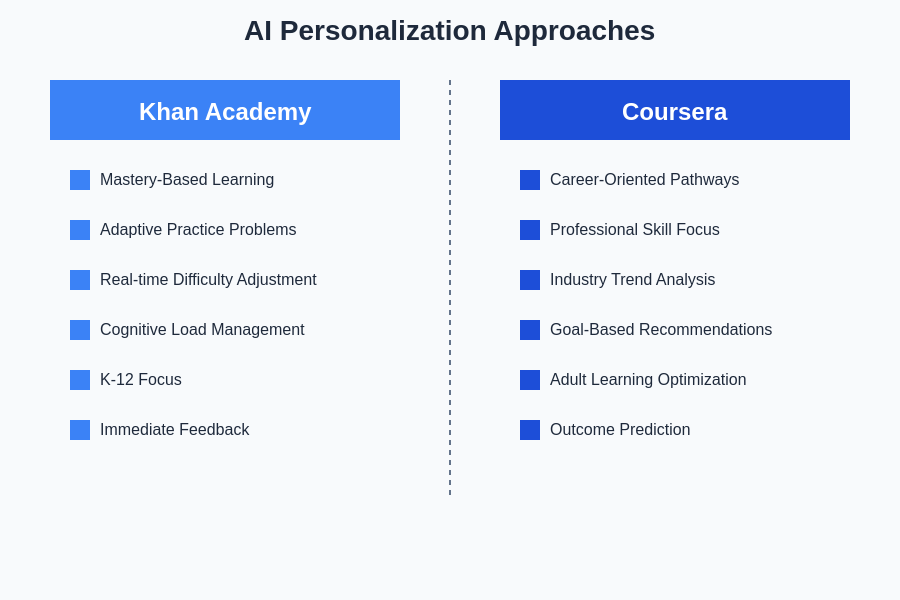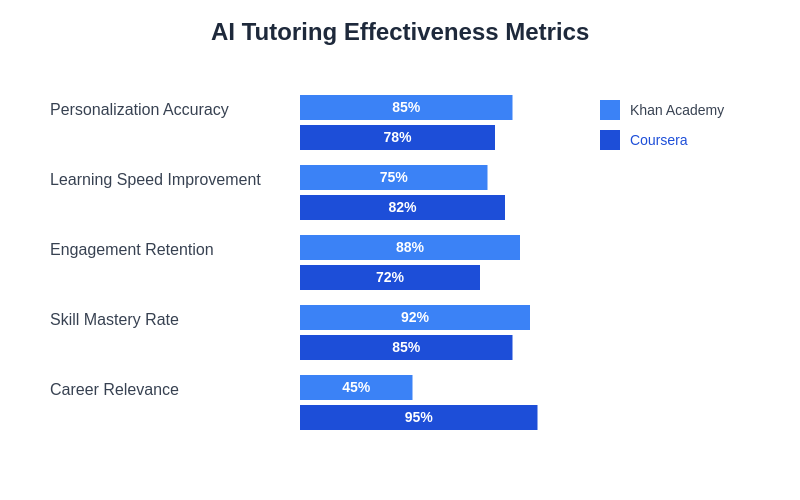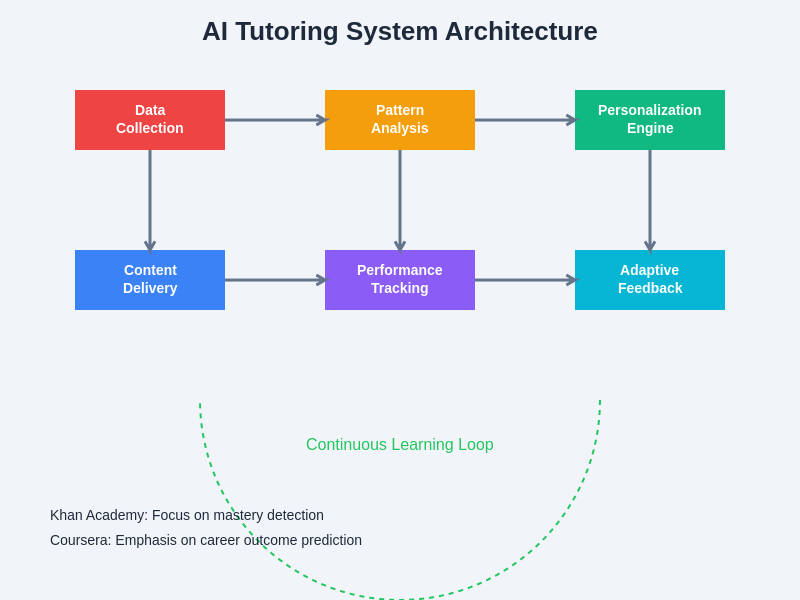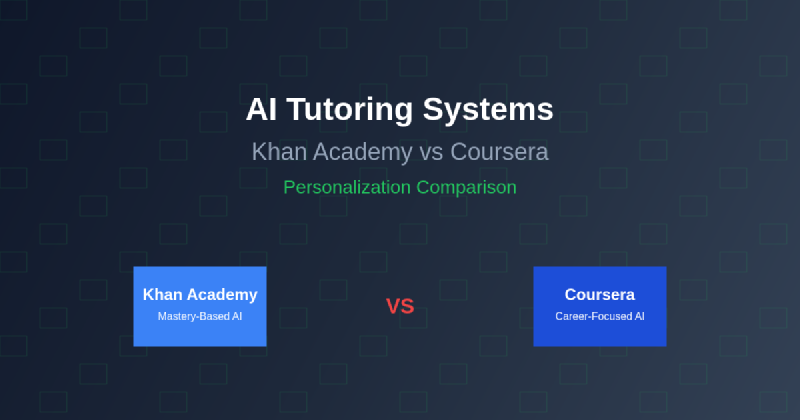The educational landscape has undergone a revolutionary transformation with the integration of artificial intelligence into tutoring systems, fundamentally changing how students learn and how educational content is delivered. At the forefront of this transformation stand two educational giants, Khan Academy and Coursera, each employing sophisticated AI-driven personalization strategies to enhance learning outcomes and student engagement. This comprehensive analysis explores the intricate mechanisms through which these platforms leverage artificial intelligence to create tailored educational experiences that adapt to individual learning patterns, preferences, and academic goals.
Explore the latest AI education trends to understand how artificial intelligence is reshaping the future of learning and educational technology. The evolution of AI tutoring systems represents a paradigm shift from traditional one-size-fits-all educational approaches to highly customized learning journeys that recognize and accommodate the unique cognitive patterns and learning styles of individual students.
The Foundation of AI-Powered Personalization
The implementation of artificial intelligence in educational platforms requires sophisticated understanding of learning psychology, cognitive science, and data analytics to create meaningful personalization that genuinely enhances educational outcomes. Khan Academy and Coursera have each developed distinct approaches to this challenge, utilizing different AI methodologies and philosophical frameworks to address the diverse needs of their respective user bases. Khan Academy focuses primarily on mastery-based learning through adaptive practice systems, while Coursera emphasizes comprehensive course completion and skill development through personalized pathway recommendations and content curation.
The fundamental difference in their approaches stems from their target audiences and educational objectives. Khan Academy primarily serves K-12 students and individuals seeking to master specific academic subjects through practice and repetition, while Coursera caters to adult learners pursuing professional development, career advancement, and higher education credentials. These distinct missions have shaped their AI implementations in ways that reflect their understanding of how different demographic groups learn most effectively and what motivational factors drive continued engagement with educational content.
Khan Academy’s Mastery-Based AI Architecture
Khan Academy’s artificial intelligence system operates on the principle of mastery-based learning, where students must demonstrate comprehensive understanding of foundational concepts before progressing to more advanced material. The platform’s AI algorithms continuously analyze student performance across multiple dimensions, including response time, accuracy patterns, mistake frequency, and learning velocity to create detailed cognitive models for each individual learner. This data-driven approach enables the system to identify knowledge gaps with remarkable precision and automatically adjust content difficulty and presentation style to optimize learning efficiency.
The platform’s AI tutoring system employs sophisticated pattern recognition algorithms that can detect subtle indicators of student confusion, frustration, or boredom based on interaction patterns and performance metrics. When the system identifies that a student is struggling with particular concepts, it automatically provides additional practice problems, alternative explanations, or supplementary resources designed to address the specific areas of difficulty. Conversely, when students demonstrate mastery of concepts more quickly than anticipated, the AI accelerates their progression through the curriculum to maintain optimal challenge levels and prevent disengagement due to repetitive or overly simplistic content.

The fundamental differences in personalization approaches between Khan Academy and Coursera reflect their distinct educational philosophies and target demographics. While Khan Academy focuses on mastery-based learning with adaptive practice systems, Coursera emphasizes career-oriented pathways with professional skill development at its core.
Experience advanced AI tutoring with Claude to supplement your learning journey with personalized assistance and comprehensive educational support. The integration of multiple AI systems creates a robust educational ecosystem that addresses various learning needs and preferences through complementary technological approaches.
Coursera’s Professional Development Focus
Coursera’s artificial intelligence architecture is specifically designed to support adult learners pursuing professional development and career advancement through comprehensive course offerings from leading universities and industry partners. The platform’s AI systems analyze learner behavior, career objectives, skill assessments, and industry trends to recommend personalized learning pathways that align with individual professional goals and market demands. This career-focused approach distinguishes Coursera’s AI implementation from more academically oriented platforms by emphasizing practical skill acquisition and real-world application of knowledge.
The platform’s recommendation algorithms utilize collaborative filtering, content-based filtering, and deep learning techniques to identify courses and specializations that will most effectively advance each learner’s career trajectory. The AI considers factors such as current skill levels, desired career outcomes, industry requirements, and learning preferences to create customized educational roadmaps that maximize the return on investment for professional development efforts. Additionally, the system continuously updates recommendations based on evolving industry standards, emerging technologies, and changing job market conditions to ensure that learners acquire relevant and marketable skills.
Adaptive Learning Algorithms and Implementation
The core strength of both platforms lies in their sophisticated adaptive learning algorithms that continuously refine their understanding of individual learning patterns and optimize content delivery accordingly. Khan Academy’s adaptive algorithms focus on micro-level adjustments within specific subject areas, analyzing performance on individual problems and concepts to provide immediate feedback and remediation. The system tracks learning momentum, identifies optimal practice intervals, and adjusts difficulty curves to maintain engagement while ensuring thorough comprehension of fundamental concepts.
Coursera’s adaptive algorithms operate at a macro level, analyzing completion patterns, engagement metrics, and assessment performance across entire courses and specializations to optimize the overall learning experience. The platform’s AI systems consider factors such as preferred learning modalities, optimal session lengths, effective instructional formats, and motivational triggers to personalize not just content selection but also content presentation and pacing. This comprehensive approach to adaptation ensures that learners receive educational experiences that align with their individual learning preferences and life circumstances.
Data Analytics and Learning Insights
Both platforms leverage extensive data analytics to generate actionable insights about learning effectiveness and student progress, though they approach data utilization from different perspectives and with different objectives. Khan Academy’s analytics focus on granular performance metrics that enable precise identification of conceptual understanding and skill development within specific academic domains. The platform tracks thousands of data points for each student, including problem-solving strategies, common error patterns, help-seeking behavior, and persistence indicators to create comprehensive learning profiles that inform both immediate instructional decisions and long-term curriculum planning.
Coursera’s data analytics emphasize broader patterns of professional skill development and career advancement, analyzing how different learning pathways contribute to career outcomes and professional growth. The platform correlates course completion patterns with industry certifications, job placement rates, salary improvements, and career progression to validate the effectiveness of different educational approaches and continuously refine their recommendation algorithms. This outcome-focused analytics approach enables Coursera to demonstrate tangible value for professional development investments while optimizing the platform’s ability to support career advancement goals.

The comparative effectiveness metrics reveal distinct strengths in each platform’s AI implementation. Khan Academy excels in personalization accuracy and engagement retention for academic learning, while Coursera demonstrates superior performance in career relevance and learning speed improvement for professional development contexts.
Enhance your research capabilities with Perplexity to gather comprehensive information about educational technologies and learning methodologies that complement AI-powered tutoring systems. The integration of multiple research tools creates opportunities for deeper understanding of complex educational concepts and emerging trends in artificial intelligence applications.
Personalization Methodologies and Approaches
The methodologies employed by Khan Academy and Coursera for creating personalized learning experiences reflect their distinct educational philosophies and target audience requirements. Khan Academy’s personalization methodology centers on cognitive load management and scaffolded learning, where the AI system carefully controls the complexity and presentation of new concepts to optimize learning efficiency. The platform’s algorithms analyze cognitive capacity indicators and adjust content delivery to prevent overwhelming students while ensuring sufficient challenge to promote growth and engagement.
Coursera’s personalization methodology emphasizes goal-oriented learning and skill-based competency development, where the AI system aligns educational content with specific career objectives and professional requirements. The platform’s algorithms consider industry standards, job market trends, and individual career aspirations to create learning pathways that maximize professional relevance and practical applicability. This approach ensures that time invested in learning translates directly into career advancement opportunities and enhanced professional capabilities.
User Interface and Experience Optimization
The user interface design and experience optimization strategies employed by both platforms demonstrate sophisticated understanding of how AI-powered personalization should be seamlessly integrated into educational workflows without creating additional cognitive burden or technical complexity. Khan Academy’s interface emphasizes simplicity and focus, with AI-driven features operating transparently in the background to provide personalized content and feedback without requiring explicit user configuration or management. The platform’s design philosophy prioritizes learning flow and minimizes distractions that could interfere with educational objectives.
Coursera’s interface balances comprehensiveness with usability, providing learners with detailed insights into their progress and recommended learning pathways while maintaining intuitive navigation and clear educational objectives. The platform’s AI-driven features are more explicitly visible to users, allowing them to understand and influence the personalization process through goal-setting, preference configuration, and feedback mechanisms. This approach empowers learners to take active roles in shaping their educational experiences while benefiting from AI-powered optimization and recommendation systems.
Assessment and Progress Tracking Systems
The assessment and progress tracking systems implemented by Khan Academy and Coursera demonstrate sophisticated understanding of how AI can enhance traditional evaluation methods to provide more accurate and actionable feedback about learning progress. Khan Academy’s assessment system employs continuous formative assessment through practice problems and exercises, with AI algorithms analyzing response patterns to identify mastery levels and learning gaps in real-time. This approach enables immediate intervention when students encounter difficulties and prevents the accumulation of knowledge gaps that could impede future learning.
Coursera’s assessment system combines traditional summative assessments with project-based evaluations and peer review mechanisms, using AI to analyze learning outcomes across multiple dimensions and provide comprehensive feedback about skill development and competency acquisition. The platform’s AI systems can identify correlations between different types of assessment performance and real-world skill application, enabling more accurate prediction of professional success and career advancement potential based on educational performance indicators.
Machine Learning Model Evolution and Improvement
Both platforms continuously evolve their machine learning models based on accumulated data and user feedback, though they approach model improvement from different perspectives and with different optimization objectives. Khan Academy’s machine learning models focus on improving prediction accuracy for individual student performance and optimizing content delivery algorithms to enhance learning efficiency. The platform conducts extensive A/B testing and experimentation to validate model improvements and ensure that algorithmic changes result in measurable improvements in educational outcomes.
Coursera’s machine learning models emphasize improving career outcome predictions and optimizing professional development pathways to maximize learner success in achieving their career objectives. The platform analyzes long-term outcomes and career progression data to validate the effectiveness of different learning approaches and continuously refine their recommendation algorithms based on real-world professional success indicators. This outcome-oriented approach ensures that the platform’s AI systems remain aligned with the practical needs and goals of professional learners.

The architectural framework underlying both platforms demonstrates the sophisticated integration of multiple AI components working in harmony to deliver personalized learning experiences. The continuous learning loop ensures that system performance improves over time through iterative data collection, analysis, and optimization processes.
Integration with Educational Ecosystems
The integration capabilities and ecosystem compatibility of both platforms reflect their understanding of how AI-powered tutoring systems should complement rather than replace traditional educational approaches and institutional frameworks. Khan Academy’s integration strategy focuses on supporting formal educational institutions and homeschooling environments by providing supplementary resources and assessment tools that enhance traditional instruction. The platform’s APIs and data sharing capabilities enable schools and educators to incorporate AI-powered personalization into existing curricula and teaching methodologies.
Coursera’s integration strategy emphasizes corporate training programs and professional development initiatives, with enterprise features that enable organizations to provide customized learning experiences for their employees. The platform’s AI systems can analyze organizational skill requirements and industry trends to recommend learning pathways that align with business objectives and professional development goals. This enterprise-focused integration approach positions Coursera as a comprehensive solution for organizational learning and development needs.
Content Curation and Quality Assurance
The content curation and quality assurance processes employed by both platforms demonstrate sophisticated understanding of how AI can enhance educational content development and maintenance while ensuring accuracy, relevance, and pedagogical effectiveness. Khan Academy’s content curation process combines human expertise with AI-powered analysis to identify gaps in educational coverage and optimize content organization for maximum learning effectiveness. The platform’s AI systems analyze user engagement patterns and learning outcomes to identify content that requires updating, supplementation, or reorganization.
Coursera’s content curation process leverages partnerships with leading universities and industry experts while using AI to analyze market trends and skill requirements to ensure content remains current and professionally relevant. The platform’s AI systems monitor industry developments and emerging technologies to identify opportunities for new course development and existing content updates. This market-responsive approach ensures that Coursera’s educational offerings remain aligned with evolving professional requirements and career advancement opportunities.
Challenges and Limitations in AI Tutoring
Despite their sophisticated implementations, both platforms face significant challenges and limitations in their AI tutoring systems that reflect broader issues in artificial intelligence applications for education. Privacy concerns, algorithmic bias, and the complexity of measuring learning effectiveness represent ongoing challenges that require continuous attention and improvement. Khan Academy must balance personalization with privacy protection while ensuring that their AI systems do not inadvertently disadvantage students from different backgrounds or with different learning styles.
Coursera faces challenges related to the rapidly changing nature of professional skills and the difficulty of predicting long-term career outcomes based on educational performance. The platform must continuously update its AI models to reflect evolving industry requirements while maintaining the stability and reliability that learners depend on for their professional development planning. Additionally, both platforms must address concerns about the potential for AI systems to limit exposure to diverse perspectives and learning approaches through over-optimization of personalized content delivery.
Future Developments and Technological Advancement
The future development trajectories of both platforms reflect emerging trends in artificial intelligence and educational technology that promise to further enhance the effectiveness and accessibility of personalized learning experiences. Khan Academy is exploring advanced natural language processing capabilities that could enable more sophisticated tutoring interactions and explanations, as well as computer vision technologies that could analyze student engagement and emotional states to optimize learning experiences. These technological advancements could create more responsive and empathetic AI tutoring systems that better understand and support individual learning needs.
Coursera is investigating the integration of virtual and augmented reality technologies with their AI systems to create immersive learning experiences that better simulate real-world professional environments and challenges. The platform is also exploring advanced predictive analytics that could provide more accurate career guidance and skill development recommendations based on comprehensive analysis of industry trends and individual aptitudes. These innovations could transform professional development by providing more engaging and effective learning experiences that directly translate into career advancement opportunities.
The continued evolution of AI tutoring systems represents a significant opportunity to democratize access to high-quality, personalized education while addressing the diverse learning needs of students across different demographics, backgrounds, and educational objectives. The success of platforms like Khan Academy and Coursera demonstrates the potential for artificial intelligence to enhance rather than replace human instruction, creating educational experiences that combine the scalability and consistency of technology with the creativity and empathy of human educators.
Disclaimer
This article is for informational purposes only and does not constitute professional educational or career advice. The information presented is based on publicly available data and general understanding of AI tutoring systems. Individual experiences with educational platforms may vary, and readers should conduct their own research and consider their specific learning needs when selecting educational technologies. The effectiveness of AI-powered personalization depends on various factors including individual learning styles, goals, and engagement levels.
